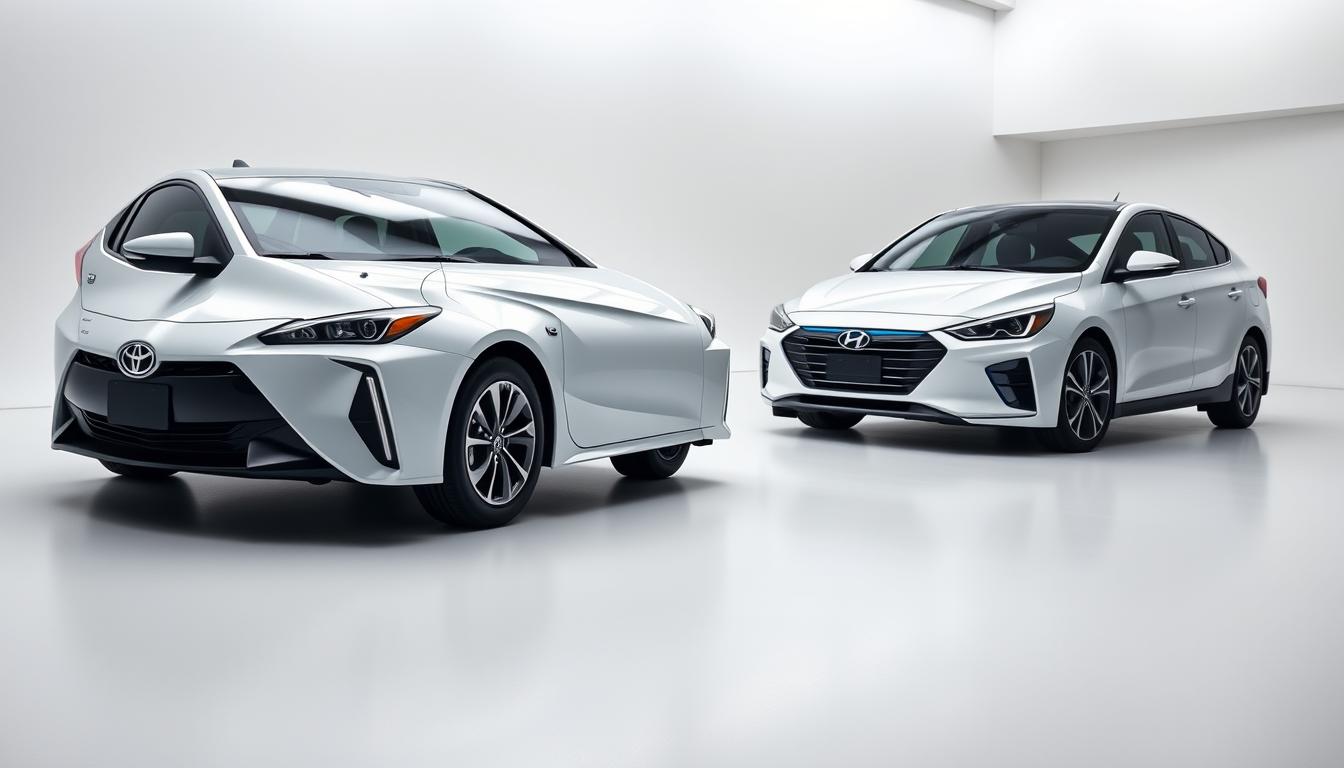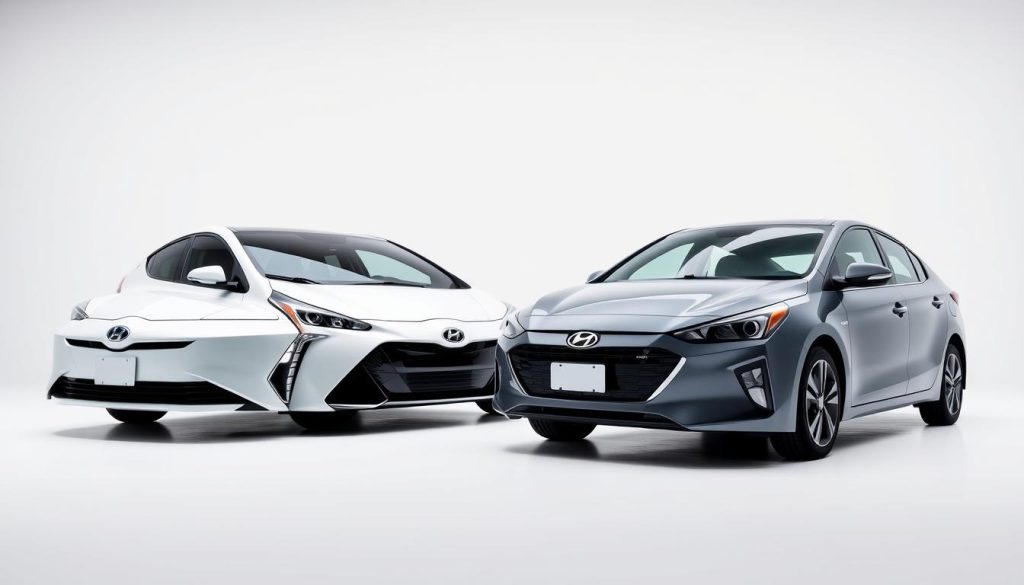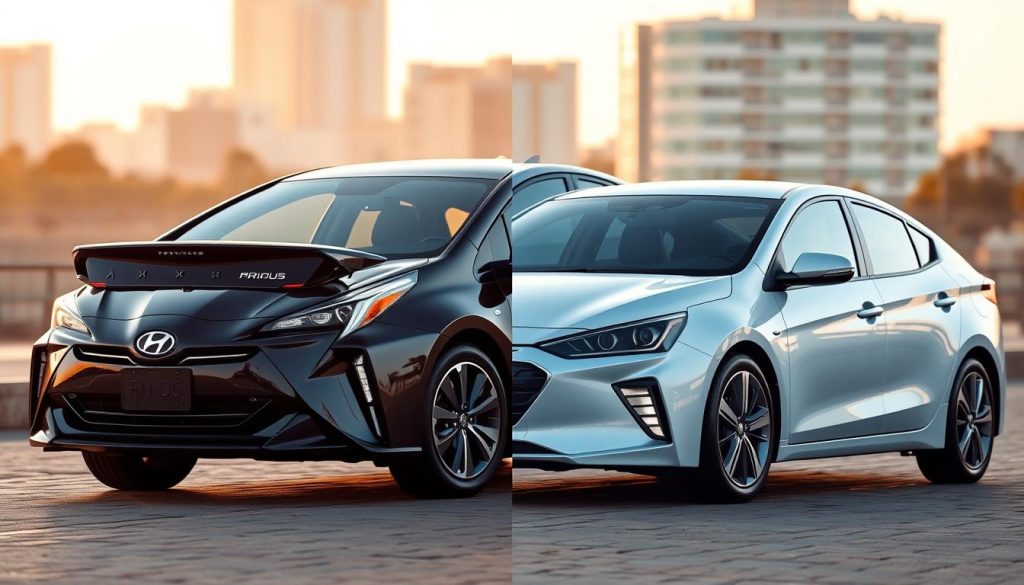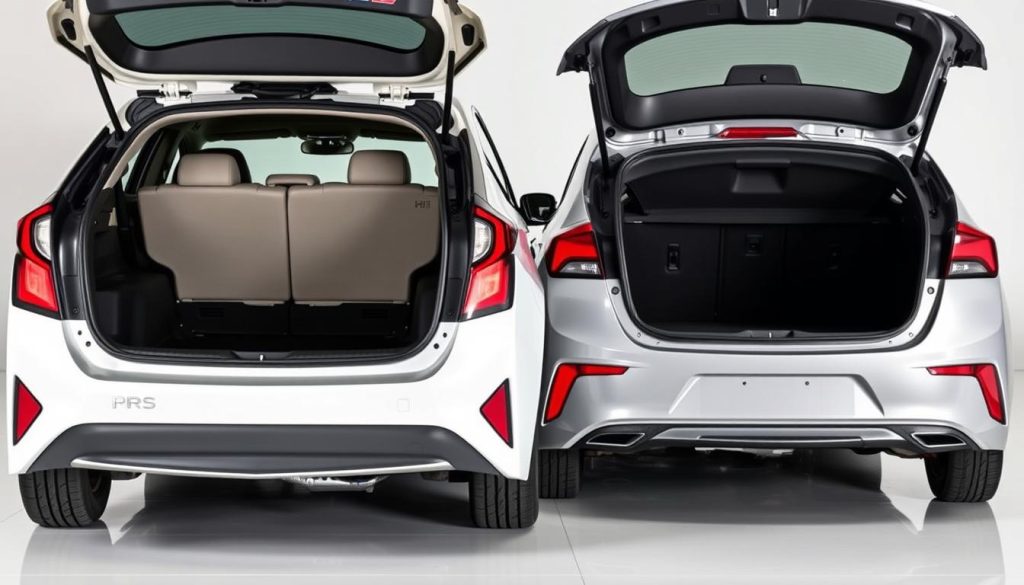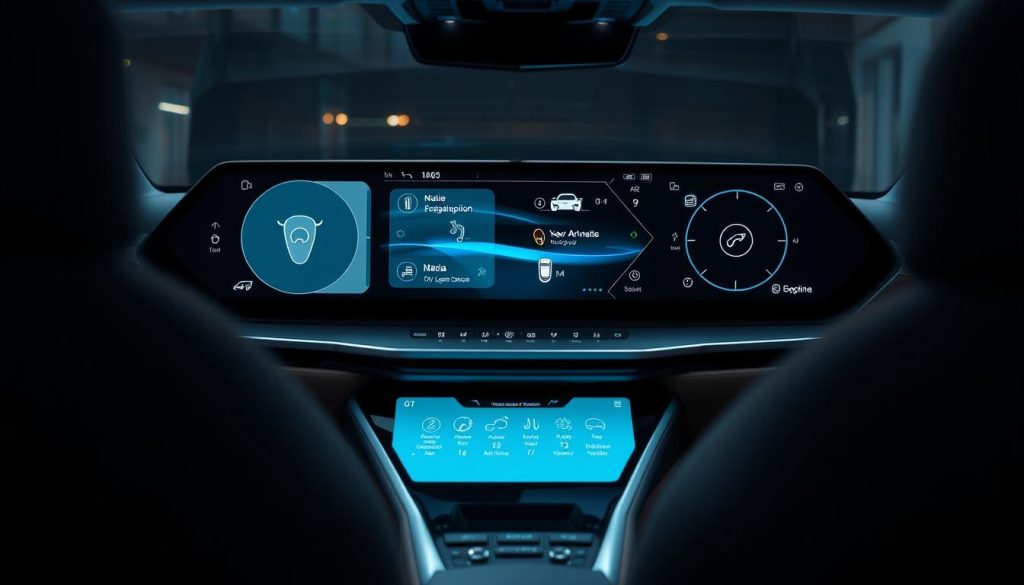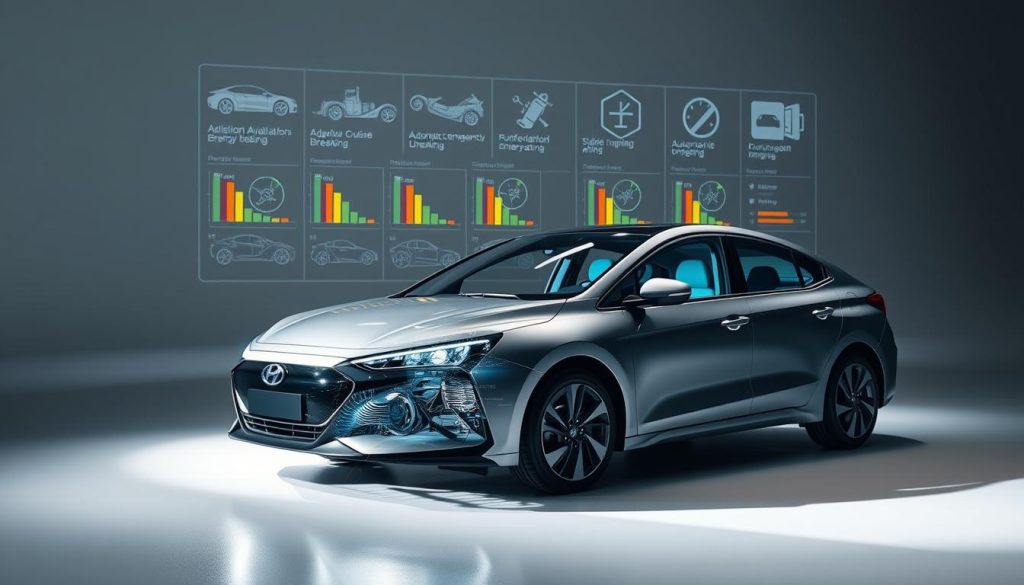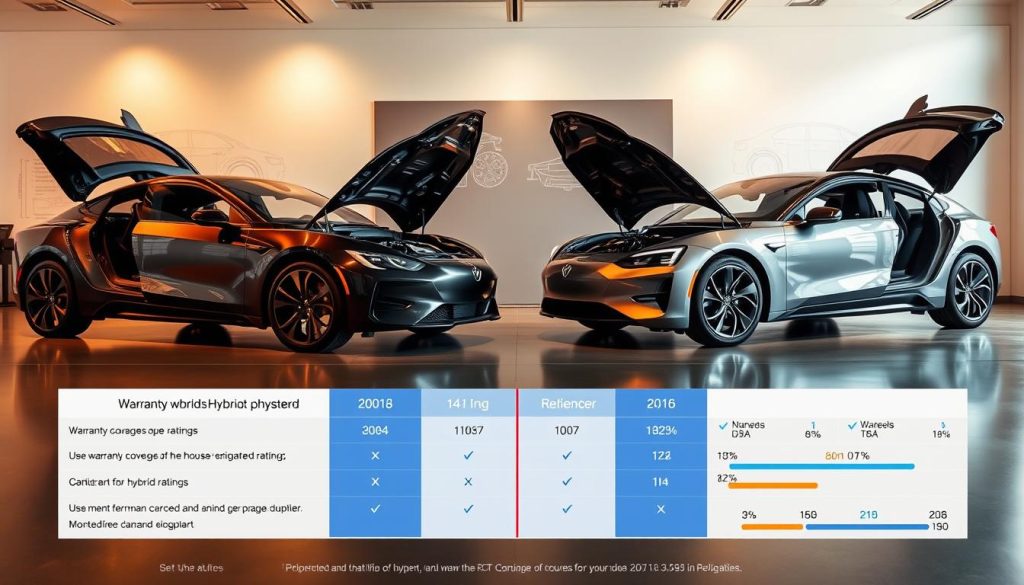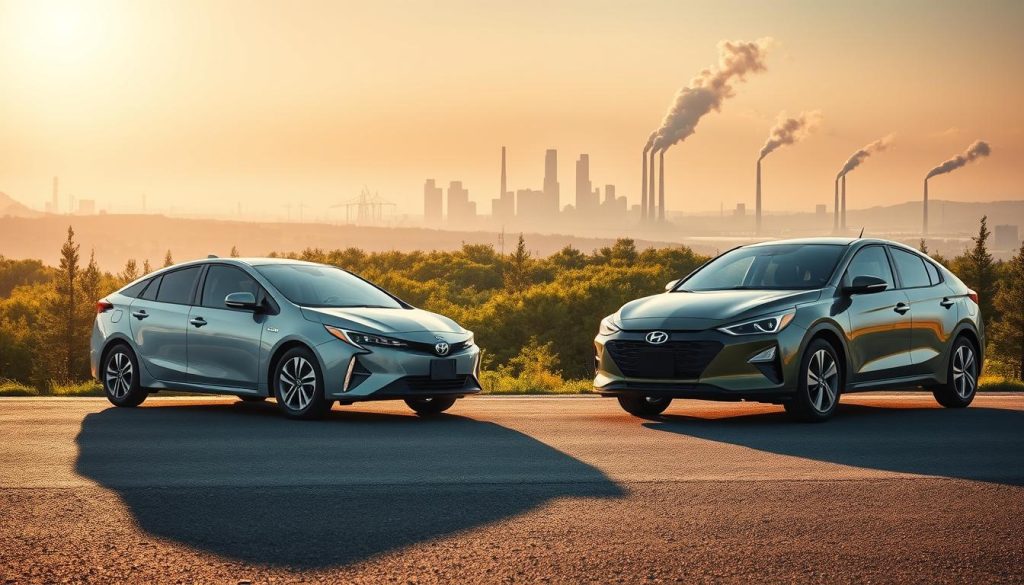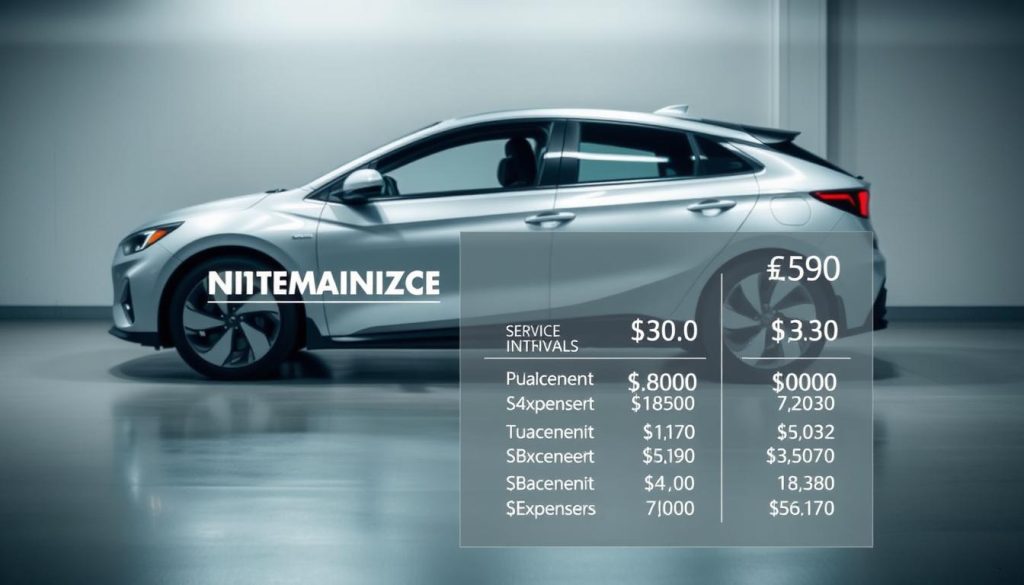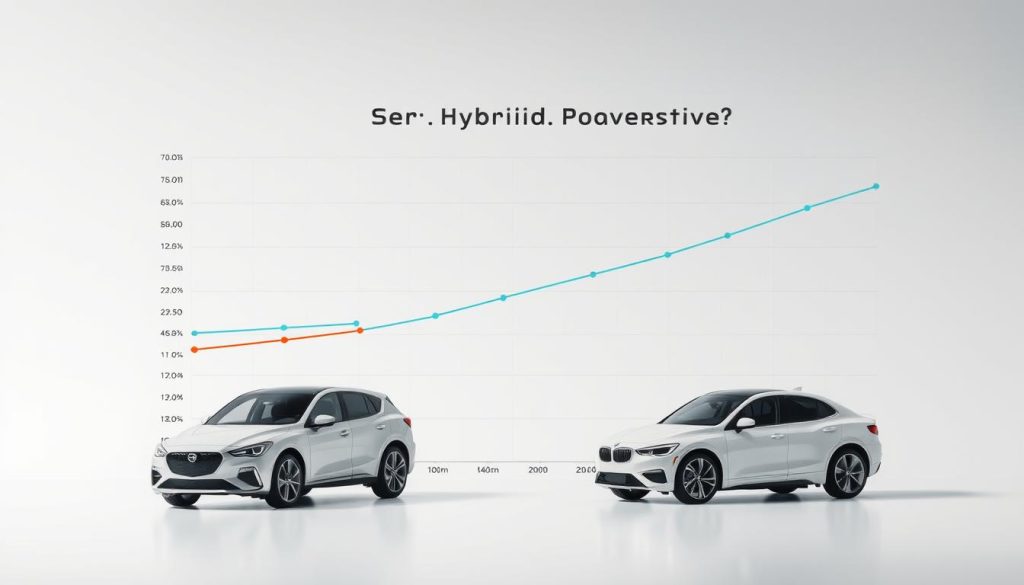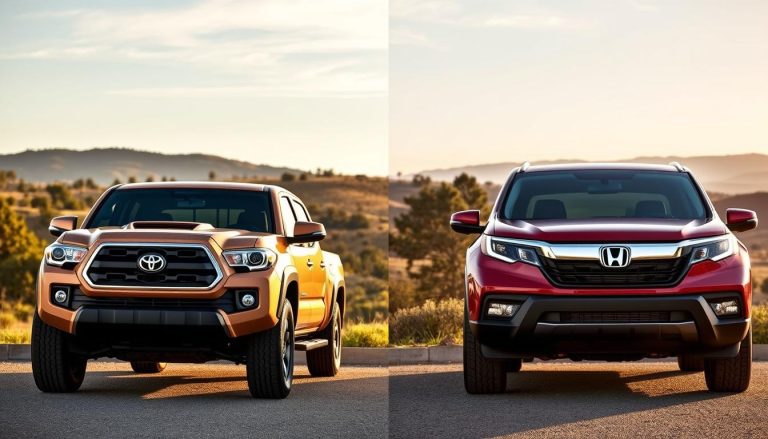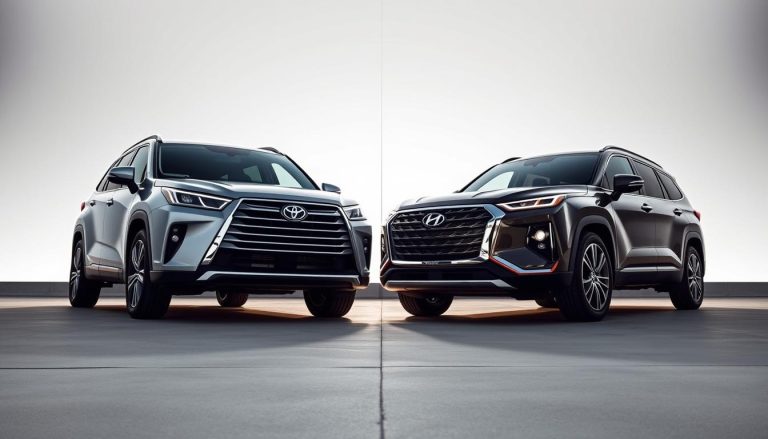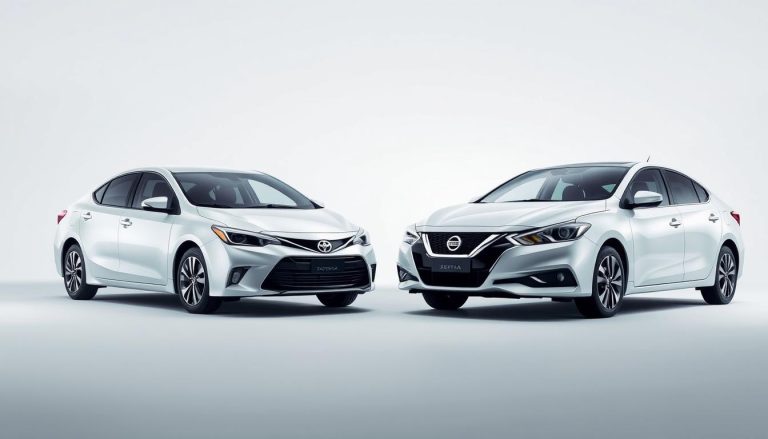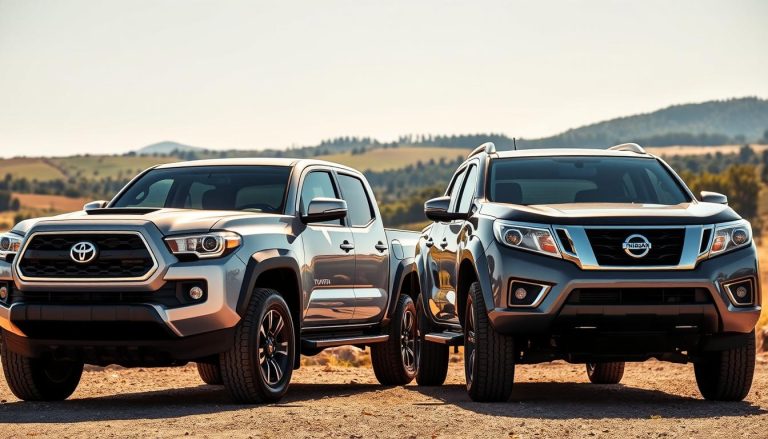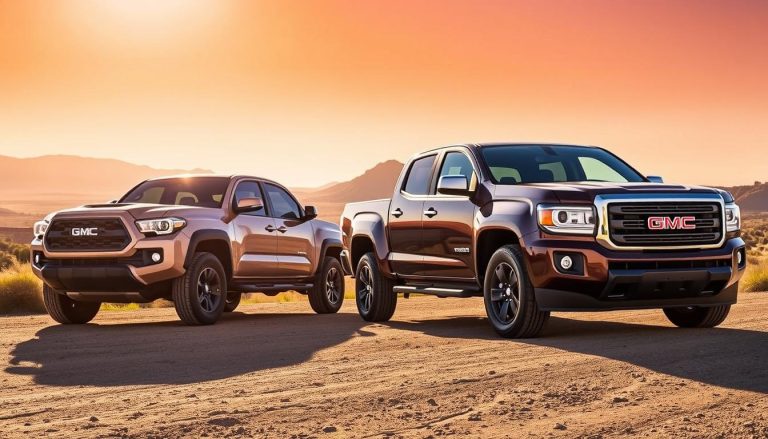Prius vs Ioniq: Which Hybrid Car Is Right for You?
The world of hybrid cars has changed a lot. Toyota Prius and Hyundai Ioniq are now top choices for those who care about the planet. These cars use new tech to save fuel and reduce harm to the environment.
It’s hard to pick between the Toyota Prius and Hyundai Ioniq. Each car has its own special features. We’ll look at what’s important when choosing a hybrid car.
The debate between Prius and Ioniq is more than just about saving fuel. People want a car that’s reliable, comfortable, and has the latest tech. This guide will show you the key differences between these two popular hybrids.
More and more people see hybrid cars as a smart choice. They’re good for the planet and your wallet. Knowing the Prius and Ioniq’s features will help you make the right choice, whether you drive a lot in the city or on long trips.
Understanding Hybrid Technology: Toyota vs Hyundai
Hybrid cars are a big step forward in car tech. They mix traditional engines with electric power. This makes them more efficient and better for the planet.
https://www.youtube.com/watch?v=Sx956cKtqpc
Toyota and Hyundai are at the forefront of hybrid car tech. They each have their own way of making hybrid cars. This gives drivers more choices if they care about the environment.
Basic Principles of Hybrid Powertrains
Hybrid cars use a smart system with different power sources:
- Gasoline engine for main power
- Electric motor for extra boost
- Battery to hold electrical energy
Battery and Electric Motor Integration
The core of hybrid cars is their advanced battery and electric motor systems. Toyota and Hyundai have their own ways to make these systems more efficient:
| Manufacturer | Battery Type | Motor Integration |
|---|---|---|
| Toyota | Nickel-Metal Hydride | Integrated Parallel Hybrid System |
| Hyundai | Lithium-Ion Polymer | Dual-Clutch Hybrid Transmission |
Regenerative Braking Systems
Regenerative braking turns braking energy into electric power. It’s a key part of hybrid cars. Toyota and Hyundai have made this tech better for their cars:
- Catch energy when slowing down
- Turn kinetic energy into electric charge
- Save energy in the car’s battery
This tech shows how car tech is always getting better. It makes cars more efficient and good for the planet.
Price Comparison and Value Proposition
When looking at hybrid cars, the cost is key for buyers. The Hyundai Ioniq and Toyota Prius offer different values to think about.
The prices of these cars show some big differences. The Hyundai Ioniq starts at $24,695, while the Toyota Prius starts at $29,545. This $5,000 difference could sway those watching their budget.
- Hyundai Ioniq Base Price: $24,695
- Toyota Prius Base Price: $29,545
- Price Difference: Approximately $5,000
Costs go beyond the first price you see. Buyers should think about:
- Fuel efficiency
- Maintenance costs
- Insurance rates
- Potential resale value
The Ioniq is cheaper to start with, but the Prius is known for being reliable. Buyers should look at the total cost over time, not just the first price.
Smart hybrid car buyers look beyond the initial price tag and consider the complete financial picture.
Each car has its own special value. The Ioniq is a budget-friendly choice for hybrid tech. The Prius is a well-known brand with a strong track record.
Fuel Efficiency Battle: MPG Ratings and Real-World Performance
Fuel efficiency is key for those who want eco-friendly transportation. The hybrid car market has made big strides in saving fuel. The Hyundai Ioniq and Toyota Prius are at the forefront with their fuel-saving tech.
Looking at fuel efficiency, both cars do well in different driving situations. Here’s a closer look at their fuel economy:
City Driving Efficiency
- Hyundai Ioniq: 58 MPG in urban areas
- Toyota Prius: 57 MPG in the city
- They perform almost the same in city traffic
Highway Performance Numbers
On highways, these cars show off their engineering skills:
- Hyundai Ioniq: 60 MPG on highways
- Toyota Prius: 56 MPG on long trips
- The Ioniq has a slight edge on long drives
Combined Fuel Economy Results
The mpg comparison gives us a better look at overall fuel efficiency:
| Vehicle | City MPG | Highway MPG | Combined MPG |
|---|---|---|---|
| Hyundai Ioniq | 58 | 60 | 59 |
| Toyota Prius | 57 | 56 | 56.5 |
Real-world driving can vary. It depends on how you drive, the roads, and how well you maintain your car. Expect some differences from the lab tests.
Exterior Design and Aerodynamics
The look of hybrid cars is more than just style. For the Toyota Prius and Hyundai Ioniq, how they look affects how they perform. Each car shows off its brand’s unique style.
The Toyota Prius has a futuristic and bold exterior. It’s known for its:
- Sharp angular lines
- Aggressive front grille design
- Aerodynamic profile that cuts through air efficiently
On the other hand, the Hyundai Ioniq has a more subtle look. Its features include:
- Clean, streamlined silhouette
- Smoother contours
- Less dramatic styling compared to the Prius
Both cars focus on being aerodynamic. Their sleek designs help them move through the air better. This improves their fuel economy and performance. The Prius is bold, while the Ioniq is more refined.
Design isn’t just about looks—it’s about intelligent engineering that maximizes efficiency.
Both cars have designs that are both stylish and practical. They show how cars can look good and be good for the environment.
Interior Comfort and Cabin Features
When looking at hybrid cars, the inside matters a lot. The car’s interior is your own special space. It’s where comfort and usefulness come together. The Toyota Prius and Hyundai Ioniq have their own ways to make the inside great, depending on what you like.
Seating Configuration
Comfort is key in these hybrid cars. The Prius offers:
- Ergonomic seats with great lumbar support
- Roomy legroom for everyone
- Seats that adjust for the best comfort
The Ioniq has its own perks, like:
- Seats that are sleek and streamlined
- Light materials for less weight
- Softer cushions for long trips
Dashboard Layout and Controls
The dashboards show off the latest in car tech. The Prius has a digital-first approach, with:
- A big touchscreen in the middle
- A unique floating console
- A simple control panel
Interior Materials Quality
The inside of these cars is all about top-notch materials. The choice of fabrics and surfaces makes the inside feel fancy and well-made.
Looking at the materials, we see small but important differences:
| Feature | Toyota Prius | Hyundai Ioniq |
|---|---|---|
| Seat Fabric | Synthetic leather | Eco-friendly cloth |
| Dashboard Finish | Soft-touch plastic | Matte metallic accents |
Both cars show that today’s hybrids are more than just fuel-efficient. They’re about making driving fun and comfy.
Cargo Space and Practical Considerations
When looking for hybrid cars, cargo space is key. The Toyota Prius and Hyundai Ioniq have different storage solutions. They meet various practical needs.
- Hyundai Ioniq Cargo Volumes:
- To parcel shelf: 456 liters
- To roof: 563 liters
- Rear seats down: 1,518 liters
- Toyota Prius Cargo Volumes:
- To parcel shelf: 343 liters
- To roof: 502 liters
- Rear seats down: 1,558 liters
The Hyundai Ioniq has a bit more cargo space in its standard form. But, plug-in hybrid versions of both models have less trunk space because of the battery.
Practical storage isn’t just about total volume – it’s about smart design and usability.
Both cars have split-folding rear seats for more flexibility. The Toyota Prius has a bit more room when the rear seats are folded. This makes it great for weekend trips or extra hauling needs.
But, it’s not just about the numbers. Interior storage, cargo covers, and design matter a lot for owning a hybrid car.
Prius vs Ioniq: Direct Performance Comparison
When we look at hybrid cars like the Prius and Ioniq, we see more than just fuel efficiency. Modern automotive technology brings together eco-friendly driving and fun road dynamics. These two cars show different ways to design and improve performance.
Acceleration and Power Output
The Prius and Ioniq show interesting differences in performance. Toyota’s Prius has a 1.8-litre engine that works with electricity to make 122 horsepower. Hyundai’s Ioniq, on the other hand, has a 1.6-litre engine that makes 141 horsepower.
- Prius: 1.8L hybrid system, 122 hp
- Ioniq: 1.6L hybrid system, 141 hp
- Power difference: 19 horsepower advantage for Ioniq
Handling Characteristics
How a car handles is key when choosing a hybrid. The Ioniq feels more responsive because of its higher power. The steering and cornering are a bit different between the two models.
| Characteristic | Prius | Ioniq |
|---|---|---|
| Steering Responsiveness | Good | Very Good |
| Cornering Stability | Stable | More Agile |
Braking Performance
Hybrid cars use special braking systems. Both the Prius and Ioniq use advanced tech to turn braking energy into battery power.
The Ioniq’s braking system is a bit better, making stops smoother. If you want precise control over braking, you’ll notice the difference between these two cars.
Technology and Infotainment Systems
Automotive technology has changed the hybrid cars market a lot. It has made how drivers use their cars much better. The Hyundai Ioniq and Toyota Prius have top-notch infotainment systems. These systems meet the needs of today’s drivers for staying connected.
Both cars have amazing tech features that make driving better. The main tech highlights are:
- Large central touchscreen displays
- Smartphone integration capabilities
- Advanced connectivity options
- Digital instrument clusters
Now, let’s look at the tech specs of these hybrid cars:
| Feature | Hyundai Ioniq | Toyota Prius |
|---|---|---|
| Touchscreen Size | 10.25-inch | 8-inch to 11.6-inch |
| Apple CarPlay | Standard | Standard |
| Android Auto | Standard | Available on select models |
| Wireless Charging | Available | Available on higher trims |
The tech in these hybrid cars is more than just entertainment. Drivers get easy smartphone linking, smart interfaces, and advanced connectivity. This keeps them connected while driving.
Modern hybrid cars are not just about saving fuel—they’re advanced tech platforms on wheels.
Wireless phone mirroring and voice commands make it easy and safe to use the car’s features. Each car has special tech features that fit different users’ needs.
Safety Features and Crash Test Ratings
Safety is key for hybrid cars, and the Toyota Prius and Hyundai Ioniq lead the way. They use advanced technology to keep drivers and passengers safe. These cars have safety systems that go beyond the usual.
Standard Safety Equipment
The Prius and Ioniq have strong standard safety features. They give drivers peace of mind. Some of these features include:
- Multiple airbag systems
- Anti-lock braking systems (ABS)
- Electronic stability control
- Rearview cameras
- Tire pressure monitoring systems
Advanced Driver Assistance Systems
Hybrid cars are now smarter and safer thanks to new technology. The Prius and Ioniq have advanced systems to improve road safety. These include:
- Adaptive Cruise Control: Keeps a safe distance from the car ahead
- Lane Keeping Assist: Stops you from drifting out of your lane
- Automatic Emergency Braking: Brakes for you if it sees a crash
- Blind Spot Monitoring: Warns you of cars in your blind spots
Even though crash test ratings vary, both cars show top safety performance. Buyers can trust in the safety of these modern hybrids.
Warranty Coverage and Reliability Ratings
When you buy hybrid cars, knowing about warranty coverage is key. It helps manage the cost of owning a car over time. Hyundai and Toyota have different warranty plans that can affect your car-owning experience.
Hyundai gives a five-year warranty for the Ioniq. This offers a lot of protection for buyers. Toyota’s warranty for the Prius has changed. Now, it has a more detailed coverage plan that needs careful thought.
| Manufacturer | Basic Warranty | Powertrain Warranty | Hybrid Component Coverage |
|---|---|---|---|
| Hyundai Ioniq | 5 years/60,000 miles | 10 years/100,000 miles | 10 years/100,000 miles |
| Toyota Prius | 3 years/36,000 miles | 5 years/60,000 miles | 8 years/100,000 miles |
Reliability ratings are also important for hybrid cars. Consumer reports show both models are very reliable. They have small differences in how well they last over time.
- Hyundai Ioniq is very reliable in electrical systems
- Toyota Prius has consistent performance over many years
- Both cars need less maintenance than regular cars
Before buying, check the warranty details carefully. Also, think about getting extended coverage. This can help make your investment in these advanced hybrid cars worth it.
Environmental Impact and Green Credentials
Today, people care more about the environment when buying cars. Hybrid cars are a big step towards less pollution. The Toyota Prius and Hyundai Ioniq show two ways to make cars better for the planet.
Carbon Footprint Analysis
Hybrid cars have many good points for the environment:
- They make less pollution than old cars
- They use less fuel, which is good for the city and highways
- They have a small carbon footprint when in use
“Every mile driven in a hybrid car is a step towards a cleaner planet.” – Environmental Research Institute
Manufacturing Sustainability
Making hybrid cars is also important for the planet. Toyota and Hyundai are working hard to be green:
- They use recycled materials in their cars
- They power their factories with clean energy
- They have programs to recycle car batteries
Eco-friendly transportation isn’t just about driving—it’s about the entire lifecycle of the vehicle. The Prius and Ioniq show that cars can be fast and green. They help people drive with less harm to the planet.
Maintenance Costs and Long-Term Ownership
Thinking about hybrid cars means looking at more than just the price tag. Toyota’s Prius and Hyundai’s Ioniq have different maintenance costs that buyers need to think about.
Hybrid car upkeep involves a few important things:
- Battery replacement costs
- Specialized service needs
- Regular maintenance schedules
- Parts availability
Hybrid cars often need more special care than regular cars. Both the Prius and Ioniq have low maintenance costs. Most routine services are similar to those for gasoline cars.
“Buying a hybrid means thinking about long-term reliability and service costs,” says automotive expert Michael Richards.
The biggest cost for hybrids is often the battery pack. The Prius has shown great battery life. Toyota hybrid batteries usually last 8-10 years or 150,000 miles before needing a new one.
Hyundai’s Ioniq also has good maintenance costs. Certified techs are getting better at fixing hybrids. Owners can expect regular service times and fair prices for parts.
Buyers should plan for higher initial maintenance costs. But, they’ll save money in the long run with lower fuel costs and reliable cars.
Driving Experience and Road Behavior
When looking at hybrid cars like the Toyota Prius and Hyundai Ioniq, how they drive is key. Each car has its own way of handling city streets and highways. This makes them stand out in the hybrid market.
The Toyota Prius offers a smooth ride. Its CVT makes starting and stopping easy. It’s perfect for city driving.
- Gentle acceleration in stop-and-go traffic
- Quiet electric-mode operation
- Stable handling at moderate speeds
The Hyundai Ioniq drives differently. It starts slow but picks up speed fast. Its dual-clutch automatic makes driving more fun.
| Driving Characteristic | Toyota Prius | Hyundai Ioniq |
|---|---|---|
| City Driving Performance | Smooth, Consistent | Responsive, Quick Acceleration |
| Electric Mode Capability | Excellent | Good |
| Highway Merging | Steady | Nimble |
Both cars are great in their own ways. The Prius is comfy and steady. The Ioniq is more lively. Your driving style will decide which car feels right for you.
“Driving a hybrid isn’t just about efficiency—it’s about experiencing automotive technology in motion.” – Automotive Expert
Resale Value and Depreciation Analysis
Knowing the resale value of hybrid cars is key to figuring out the total cost of owning one. Buyers want to see how their car’s value will change over time. This is important, as it affects the cost of owning cars like the Toyota Prius and Hyundai Ioniq.
- Battery health and longevity
- Technological advancements
- Consumer demand for eco-friendly vehicles
- Overall vehicle condition
Market Value Retention Insights
The Toyota Prius keeps its value well, often better than regular cars. Its long-standing reputation in the hybrid market helps it hold its value. The Hyundai Ioniq, being newer, shows good signs of retaining value too.
“Hybrid vehicles typically retain value better than traditional gas-powered cars due to lower fuel costs and increasing environmental consciousness.” – Auto Market Research Group
Historical Depreciation Patterns
Hybrid cars usually lose about 40-50% of their value in five years. The Prius tends to lose value more slowly, around 38-45%. The Ioniq, on the other hand, might see slightly higher depreciation in its early years.
When thinking about the long-term cost of owning a hybrid, consider these depreciation insights. Things like maintenance history, local demand, and the car’s condition greatly affect resale value.
Conclusion
Our deep dive into Prius vs Ioniq shows two top-notch hybrid cars. They are big steps in eco-friendly driving. Toyota and Hyundai have made cars that use less fuel, with mpg ratings up to 60. This makes them great for those who care about the planet.
Choosing between these hybrids depends on what you need and want. The Prius is known for being reliable and having the latest tech. The Ioniq, on the other hand, offers great features at a possibly lower price.
Your choice should match your lifestyle. Some might choose Toyota for its trusty hybrid history. Others might like Hyundai’s new look and fresh ideas. Think about your daily drive, charging options, and how you drive to pick the best car for you.
In the end, both Prius and Ioniq are big wins for the environment. No matter which one you pick, you’re choosing a car that’s good for the planet. It’s a smart move for drivers who want to be green and efficient.
FAQ
What are the main differences between the Toyota Prius and Hyundai Ioniq?
The Toyota Prius has a unique futuristic design. The Hyundai Ioniq looks more conventional. The Ioniq is often cheaper and has better fuel economy. But the Prius has more hybrid experience.
Which hybrid car is more fuel-efficient?
The Hyundai Ioniq might have a slight edge in MPG ratings. But, real-world fuel efficiency depends on many factors. Both cars are much better than gas cars, with the Ioniq around 58 mpg and the Prius about 56 mpg.
How do the prices compare between the Prius and Ioniq?
The Hyundai Ioniq starts at a lower price. But, the Prius might be more cost-effective over time. This includes fuel, maintenance, and resale value.
Are plug-in hybrid versions available for both models?
Yes, both Toyota and Hyundai have plug-in hybrid options. The Prius Prime and Ioniq Plug-in Hybrid allow for longer electric-only trips.
Which hybrid has better technology features?
Both cars have advanced tech, but differently. The Prius has futuristic tech with a unique display. The Ioniq has a more traditional but modern system. Both support Apple CarPlay and Android Auto.
How do the warranty coverages compare?
Hyundai offers a five-year warranty, which is often more extensive. Toyota has a solid warranty with options for extension. Both cover hybrid parts, with Hyundai providing more initial coverage.
Which car is more environmentally friendly?
Both cars are eco-friendly. The Ioniq might have a lower carbon footprint in manufacturing. But, both Toyota and Hyundai focus on sustainable practices. The environmental impact depends on many factors.
What are the performance differences between the Prius and Ioniq?
The Ioniq has more power, with 141 hp compared to the Prius’s 122 hp. The Ioniq accelerates faster, but the Prius drives smoother. Both prioritize efficiency over speed.
Which hybrid is better for city driving?
Both cars are great for city driving, using electric power in traffic. The Ioniq might have an edge in electric-only driving. But, both are designed for urban efficiency.
How do the cargo spaces compare?
The Prius has slightly more cargo space, mainly in its hatchback. But, the Ioniq offers practical and flexible space for everyday needs. Cargo space varies by trim and model type.

